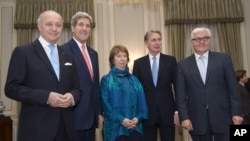Seven foreign ministers are in Vienna working against a midnight deadline to settle the more than decade-long dispute over Iran’s nuclear program, and potentially to begin to unravel crippling economic sanctions.
But a year after they reached a landmark interim agreement, negotiators indicated they may need more time on the difficult, long-term issues.
The last foreign minister to arrive, China’s Wang Yi, said Monday morning he brought some ideas for solving outstanding disputes, but he acknowledged the deadline may need to be extended.
Officials report “significant gaps” on difficult issues, some of them highly technical. British Foreign Secretary Phillip Hammond spoke Sunday night.
“We're all focused on trying to get to a deal, but I wouldn't want to give any false hopes here, we're still quite a long way apart and there are some very tough and complex issues to deal with,” Hammond said.
Key sticking points
One of the key sticking points still appears to be how much capacity Iran will have to enrich uranium, a process that can create fuel for a nuclear weapon. There are also reportedly still gaps on the pace and extent of sanctions relief, an inspections regime to verify compliance and demands that Iran disclose details of its past, secret nuclear weapons program.
Iran said it now has no interest in having nuclear weapons, and only wants a nuclear enrichment program for energy and medicine.
But negotiators from the United States, Britain, France, Germany, Russia and China - deputized by the UN Security Council - said that program must be considerably smaller than Iran has now, while Iran wants to expand its capability.
The negotiators want Iran to be at least six months, preferably a year, away from building a nuclear bomb if its leaders decide to do so, with inspectors in place to detect the move.
Iranian-American activist and author Trita Parsi said both sides need to recognize that they have to give away more than they would like.
“If this deal is going to work, if this deal is going to be durable, both sides need to give concessions, and those concessions probably have to be painful. If the expectation is that either side can keep 80 percent and only give 20 percent, even if they could get to a deal, that deal likely will not be durable,” Parsi said.
And experts said an extension won’t make it any easier to make those concessions.
There is even disagreement on how long an extension might be. Iranian sources have spoken of another year, while sources from the other side have hinted at no more than a few months.
And an extension also creates problems, with hardliners in Iran taking advantage of any rumored delay or concession, and in the United States, Republicans, who generally take a harder line on Iran, coming to power in the Senate.
Congressional approval
Parsi noted that any agreement will eventually require the U.S. president to convince Congress to ease or end sanctions against Iran.
“Time is running out for the implementation as well because the likelihood that the next president of the United States will take on lifting sanctions in Congress is not particularly great,” Parsi said. “The one president the United States has that is more committed, more invested, in this is Barack Obama.”
Obama said on ABC's "This Week" he is confident that an agreement to contain Iran’s nuclear program will gain support in the U.S. Congress.
"I’m confident that, if we reach a deal that is verifiable and assures that Iran doesn’t have breakout capacity [to develop nuclear weapons] that, not only can I persuade Congress, but I can persuade the American people that it’s the right thing to do," he said.
Obama said the good news is that the interim nuclear agreement reached a year ago with Tehran is working by stopping Iran’s nuclear program from advancing.
Appearing Sunday on the same U.S. television broadcast, ABC's "This Week," Israeli Prime Minister Benjamin Netanyahu warned against making a “historic mistake” by reaching a bad deal with Tehran.
"A bad deal would enable Iran to remain with thousands of centrifuges which it could use to enrich uranium which is what you need for a nuclear bomb. It could do so in a very short time," Netanyahu said.
Netanyahu said Iran has used the interim agreement to develop other aspects of its nuclear program, noting the U.N. atomic agency, the International Atomic Energy Agency (IAEA), has said Tehran refuses to divulge elements of its secret military nuclear program.
He urged international negotiators to maintain and even tighten the sanctions until Iran makes the concessions necessary to keep it from developing nuclear weapons.
Extension of talks likely
Middle East analyst Stephen Zunes of the University of San Francisco said an extension of the nuclear talks appears inevitable.
"This is primarily because both sides have put an enormous amount of work since the interim agreement last year and it would be bad news for all concerned if they just collapsed," Zunes said.
However, he acknowledged some distance separates the negotiating positions of each side.
"Iran wants sanctions lifted immediately, while Western states want to stagger their removal over a period of time to ensure the Iranian government abides by its commitments," Zunes said. "Other issues involve the scope of uranium enrichment and just how much can be developed, at what concentration. So, these are still fundamental issues for both sides.
"It’s still going to be a tough row to hoe by both sides," he said.
Zunes said the international negotiators, including Iranian allies Russia and China, have remained surprisingly unified in their opposition to Iran obtaining nuclear weapons.
That, he said, makes Tehran realize the opposition to its program is not just ideological, but international.
Victor Beattie contributed to this report from Washington.




